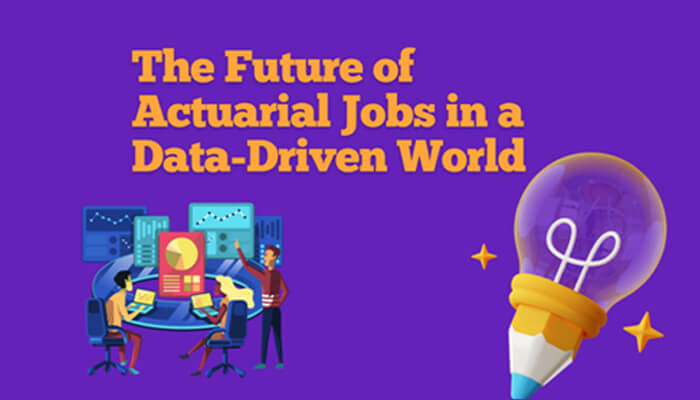In a rapidly digitizing world, it’s no surprise that the role of actuaries is changing, too. Long-known as number crunchers and statistical analysts, actuaries are now tasked with utilizing their skills not only to predict potential risks in a company or market but also to apply data-driven strategies in order to improve organizational efficiency and productivity. Actuarial jobs appear to have a bright future since they will always be important in a world that is driven by data.
With advancements in predictive analytics and artificial intelligence, actuaries are now positioned at the intersection of technology and risk management, leveraging new technology to identify complex patterns and transforming traditional investments into novel digital investment opportunities.
As technology continues to revolutionize this profession, let’s take a look at what the future holds for actuaries in a data-driven world.
Who is an Actuary?
Financial risk forecasting is the specialty of actuaries, often known as actuarial scientists. Actuarial jobs involve gathering data, and algorithms are used to determine the potential for profit or loss.
Actuary jobs are becoming increasingly important in this age of technology, data, and increasing levels of financial and risk management.
By leveraging complex actuarial models and analytical processes, actuaries can use their skills to identify and reduce financial risks, quantify exposures, and design plans for optimal risk mitigation.
Actuaries use predictive models to analyze the probability of certain events occurring and the potential financial effects so that businesses can better manage risk and optimize profits.
With their increasingly important role in the financial world, it’s easy to see why actuary jobs are some of the most coveted in the market today.
By 2020, 76% of actuaries worked in finance and insurance, according to the BLS. Actuarial data science, a new topic of actuarial science, applies machine learning to known domains.
Possible Careers for an Actuary
Common career paths for actuaries include working in insurance or finance, providing pension plans, pricing products sold by banks or other lenders, or as a financial analyst. Actuaries also often work in fields such as healthcare, manufacturing, or information technology.
In any industry where long-term decisions must be made based on uncertain risks, actuarial science has an important role to play.
Actuarial jobs are expected to expand by 24% between 2020 and 2030, according to the BLS. It is substantially faster than the average for all professions. The median actuary job income in 2020 was $111,030.
A bachelor’s degree is often required for entry-level work in the trade. Some actuaries major in mathematics or statistics, but most study actuarial science.
Experienced actuaries in Actuarial Jobs may qualify for managerial jobs and higher remuneration. As of March 2021, the average yearly compensation for an actuarial manager was $123,560, according to salary data compiled by PayScale.
What precisely does an actuary do?
Highly trained professionals, such as actuaries, evaluate risks in business, industry, and government by analyzing financial and statistical data.
They use sophisticated mathematical and analytical tools to determine the best ways to manage the risks associated with economic losses, such as insurance claims or pension payments.
Actuaries also use their knowledge of probability and statistics to identify trends and patterns in the data, understand how future events might impact the results of their work, and advise their employers on the best strategies for weathering any financial risk.
The role of actuaries often entails the following tasks:
- Estimating when something could happen in the future based on patterns in the past.
- Figuring out how much money a customer will make on their investments
- Estimating the potential monetary losses of the future
- The Validity of Data Interpretation
- Calculations made using actuarial modeling software
- Setting up policies for the business
- Price comparisons of insurance policies
- Factors in natural catastrophes, joblessness, and accidents are calculated.
What Is the Process of Becoming an Actuary?
Actuaries traditionally need a bachelor’s degree in actuarial science. You might also have a bachelor’s degree in mathematics, finance, statistics, economics, or two actuarial tests.
1. Exam P
Exam P is all about taking a chance. To take the exam, you must first sign up with the Society of Actuaries before the deadline and then book a testing session with Prometric. The three-hour, multiple-choice exam you’ll be taking will be administered by computer.
2. Exam FM
FM stands for “Financial Mathematics” on the exam. It’s a three-hour, multiple-choice exam administered on a computer. The Society of Actuaries and Prometricians handle Exam FM registration in the same way they deal with Exam P registration.
Apply for associateship after completing your actuarial exams and earning your first job. You will need to take further tests and choose a specialty: health, life, or property insurance.
You should know that becoming an actuarial scientist requires extensive study and examination.
Nevertheless, it is a good and evolving area for people who like mathematics and problem-solving.
In a data-driven society, what is the future of actuarial jobs?
With advances in data analysis tools, actuaries will increasingly be called upon to provide insight on how to interpret and use data for better risk management and more accurate product pricing.
As such, actuaries must be well-versed in the latest technologies, such as predictive analytics and machine learning, to stay competitive. The future of actuarial jobs looks bright, as they will continue to play a crucial role in a data-driven world.
1. The Expansion of Actuaries’ Reach Outside of the Field
Actuaries are increasingly working outside of insurance and consulting. The automotive sector is one such example. Due to artificial intelligence advances, actuarial jobs in auto insurance are changing rapidly.
Here is a chance for an actuary to use their expertise freshly in the field of auto insurance, one that is outside their usual remit.
Driverless cars might reduce reckless drivers’ auto insurance claims. Driverless vehicles and driver assistance technology may lower auto insurance worldwide, including in the US.
Professional actuaries nowadays may choose from a wide range of industries in which to use their skills. Actuary jobs are becoming more sought-after by businesses across sectors.
Waste management and investment banking use this area. Actuaries who can understand and manage various risks in a data-driven business environment will find jobs.
2. Career Prospects for Actuaries
Recent college graduates must adapt to a digital environment that affects many industries, not only actuary jobs.
Where do you see actuaries working in the future? Will artificial intelligence eventually make actuaries obsolete? Competition for entry-level actuary jobs is fierce in today’s graduate job market.
An average of 80 people apply for every position posted, but for a company in the Times 100, that number might jump to 650. When the employment market is this competitive, getting your first job out of college might be difficult.
Actuaries with a higher level of education and experience (say, six or more tests and a few years’ worth of work) have far better career chances.
Those who can keep going through the tests will have many more options for employment. According to the US Department of Labour Statistics, actuary jobs will rise by 18% from 2019 to 2029.
A lot quicker than the average pace across all positions. That being said, the need for and availability of opportunities for aspiring actuaries are high.
3. Prospective Insurance Actuaries
The tools accessible to actuaries may be vastly improved by using data science and AI. This new wave of data analytics may help solve social issues and open up new markets.
Actuaries use AI methods, for instance, to simulate the sales and distribution processes. It’s something they often do to figure out what makes their best-selling items so popular in certain regions.
The use of big data is also seeing new developments. Telematics devices analyze driver claims in automobiles.
Not only has technology allowed for new types of statistical analysis, but it has also aided actuaries in other ways. RPA security helps actuaries concentrate by automating data transmission and reconciliation. Thus, people may better utilize their abilities, and the company gains productivity.
In particular, actuaries are now able to use a range of sophisticated statistical models, data mining tools, and AI-driven algorithms to analyze large datasets and uncover patterns and trends.
This has enabled actuaries to develop more accurate models for predicting and evaluating the likelihood of risk. Additionally, technological advances have given actuaries the ability to automate tasks such as analyzing data, assessing risk, and making claims decisions faster and more accurately.
4. Insurance Innovation and Actuaries
The insurance industry is urging actuaries to influence innovation. Modern innovations are overhauling insurance risk management.
Companies are rethinking insurance delivery with apps, telematics, and pay-as-you-go coverage.
App-based vehicle rental, ridesharing, and autonomous driving complicate risk assessment and management. As such, this is a field where actuarial jobs may make the most significant contributions. Actuaries are transforming how firms construct new products.
They also assess their market feasibility and deliver them to customers. They do all these using a new risk analysis viewpoint and technologies.
Why Should You Think About Studying Actuarial Science?
Actuaries select this profession for many reasons, and if you are good with numbers and can manage your money well, it might be a good choice. Performing this task offers several benefits.
1. There Is a High Need for Actuaries at the Moment
The BLS predicts an above-average increase in demand for actuarial jobs between 2021 and 2031. An estimated 2,400 new positions for actuaries will become available per year from now until then.
It bodes well for your future employment prospects and enhances your resume’s marketability. Due to the extensive knowledge, testing, and training required for actuarial science, fewer people apply.
2. You Will Learn Useful, Marketable Skills
Actuarial science training will provide you with skills you can utilize in many fields. We anticipate advanced math, analysis, technology, problem-solving, critical thinking, and business economics. Everything you have learned in actuarial science may simply apply to other fields if you ever choose to quit.
3. It’s a Challenging Yet Rewarding Career Path
Getting a degree in actuarial science is no easy feat and will involve a lot of hard work. We anticipate advanced math, analysis, technology, problem-solving, critical thinking, and business economics.
4. Mathematical Curiosity Is Put To Good Use
It’s not necessary to limit oneself to a primary or secondary school mathematics education to have a career in the subject. If you are good with numbers and want to use them to help actual people and businesses succeed, consider a career in actuarial science.
5. The Possibility for Lucrative Pay Is High
As an actuary, you may expect decent compensation, too. This field bachelor’s degree is a good investment since employment prospects are exemplary and may expand over the next decade. With a higher beginning income and career prospects, this profession may help you pay for college faster.
Data Science’s Impact
Data science and actuarial jobs are revolutionizing the workplace. Through highly specialized skills, they are increasing the organization’s ability to understand their data and come up with improved solutions to their problems.
They use data-driven approaches and predictive analytics to identify trends, risks, and insights for better decision-making. With creative problem-solving skills honed through years of experience, these professionals can often find solutions that would have otherwise been overlooked.
Companies around the world are increasingly recognizing the advantages of working with data science and actuary roles, and they are taking action to incorporate these professionals into their teams. Data scientists and actuaries will significantly increase their impact in the future.
Concerning the question, “How can actuaries benefit from data science?” Some examples given by respondents are as follows:
- Data science’s speed, accuracy, and ease may improve risk, analytics, evaluations, and process management.
- Combining data science with the expertise of actuaries opens doors to new areas of work both within and outside of the insurance sector.
- When approaching an issue from a new angle, data science can be an invaluable resource.
- Actuaries may use data science to anticipate future threats and create cutting-edge responses.
- Data science is merely a new phrase for what actuaries have always done. It uses professional judgment and data-driven insights to identify a company’s best course of action.
Conclusion
Actuaries play an essential role in today’s markets and the demand for talented actuaries, specifically Actuarial jobs, is growing. Actuaries have the ability to assess risk and design financial solutions, which is essential in any industry.
This is especially true as the market moves towards new technologies such as AI. As AI becomes more prominent in industries, there will be an increased need for actuaries who are able to analyze data and determine the best course of action.
As AI continues to evolve, it is foreseeable that actuaries will become integral parts of planning, managing, and monitoring AI-enabled systems.
Therefore, despite intense competition in the actuary market, the demand for skilled actuaries is expected to remain strong in the coming years.




